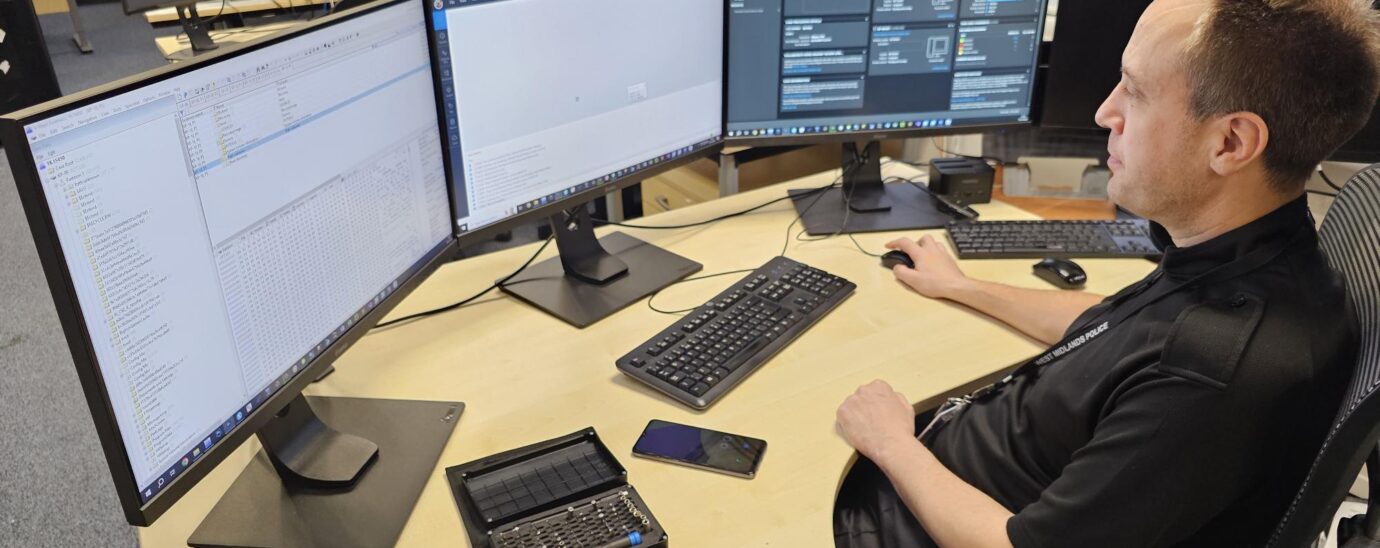Node4 Enables Faster Evidence Processing For West Midlands Police

West Midlands Police Force is the UK’s second-largest police force. It covers an area of almost 350 square miles and serves around 3 million people. The force deals with more than 2,000 emergency calls each day while also patrolling the streets and responding to incidents. West Midlands Police established its digital forensics team in 2003 to help officers deal with an increasing volume of digital evidence.
It’s estimated that 90% of UK crimes have a digital footprint, and the team’s task is to sort that data into actionable intelligence. Today, the digital forensics team’s services are a vital crimefighting tool across the West Midlands and Warwickshire, covering all areas of criminal activity but with a strong focus on investigating and prosecuting child exploitation and abuse.
The Challenge
The digital forensics team relied on on-premises IT infrastructure. But with per-case data volumes routinely passing the four terabytes mark and multiple cases on the go at any one time, they struggled to manage the necessary IT infrastructure, such as physical storage, processing power and SQL databases. Plus, the team was acutely aware of their responsibility to ensure their data was secure and managed to policing standards. However, their biggest concern was that data analysis had become very time-consuming, with a growing number of devices requiring analysis and investigation on each case.

“If you go back 10 or 20 years, the vast majority of people would have had one phone in the house and probably one PC,” explains West Midlands Police’s Digital Forensics/Incident Response Supervisor, Detective Sergeant John Price KPM, who has been recognised for his leadership and innovation on the 2024 New Years Honours list with the King’s Police Medal for Digital Forensics. “Today, when we enter a suspect’s house, most have a work phone, a personal phone, tablets, and laptops. Plus, there are doorbells, dashcams, body cams, car cams, security cameras, smart TVs, game consoles and a whole load of other internet-enabled devices that record data and could be potential evidence or exhibits.”
The Solution
Knowing the digital forensics team couldn’t continue with its on-premises IT infrastructure, West Midlands Police turned to Node4 for assistance. With regular input from the detective and other key stakeholders within the West Midlands Police Force, Node4 — in partnership with Microsoft and Exterro — built and delivered FTK Central, the UK’s first cloud-based digital forensics analysis solution.
FTK Central processes data on seized devices, building links between different exhibits and enabling concurrent investigations that lead to faster convictions. Node4 hosts the digital forensics analysis application in one of its state-of-the-art data centres. It also manages the IT infrastructure and ensures all gathered data is stored in compliance with policing and wider data protection standards. FTK Central went live in May 2022 with 50 users and, so far, has been instrumental in processing data for 70 cases.
The Results
Officers can now log into the analysis platform from their station and review all exhibit data in situ instead of travelling to the digital forensic team’s offices — saving critical time and resources and dramatically speeding up investigations.
“When you understand that around 75% of the cases we handle deal with indecent images of children, you can see why speed and accuracy are so important,” explains DS Price KPM. “We are often the ones who identify abuse of children and vulnerable persons and then work with the appropriate team to help safeguard victims — even before we move to detain perpetrators. Using this tool, cases that once took months now take weeks. Those that took days can be solved in hours. As such, I can categorically say that the solution has safeguarded children and other vulnerable victims and kept them from further harm.”
Node4’s solution helps West Midlands Police Force comply with the regulations governing how it stores and manages digital data. This includes ISO17025 2017, which sets out standards for holding and dealing with exhibits. It’s also compliant with the Forensic Science Regulators Act and adheres to Management of Police Information (MOPI) standards. Node4 also monitors all existing regulations and, when necessary, adjusts storage policies within its managed cloud environment — removing worries about compliance management from the team’s daily to-do list.
“You can imagine, with the data we’re dealing with, trust between us and our managed services provider is imperative — and we have established a high degree of trust with Node4,” notes DS Price KPM. “We explained our data management and security requirements to Node4 upfront, which were then built into the framework.”
From an administrative and budgetary standpoint, moving to the cloud has given the digital forensics team the elasticity to scale when data requirements increase. It also allows the team to pull back on capacity when the demand is not so great. This helps keep departmental IT-related costs down and enables the team to work at the same fast pace, regardless of the number of cases or data volume.
DS Price KPM concludes: “There’s an honest passion from the Node4 team to get this right for us. Their support has been superb throughout the design and roll-out process, with team members going consistently above and beyond. They understand the importance of our work and the intensity and urgency that drives our department. And they’ve delivered the tools and framework that allow us to work quickly, accurately and professionally to protect some of society’s most vulnerable people.”